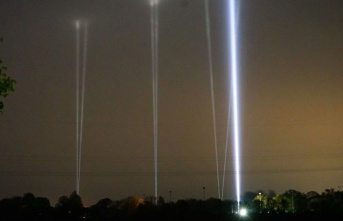The Russian war of aggression against Ukraine escalated dangerously after the blasting of the important Kachowka dam - with unforeseeable humanitarian, ecological and military consequences. The West and Ukraine blamed Moscow for blowing up the dam.
President Volodymyr Zelenskyy compared them to the use of a weapon of mass destruction. Water masses from the Kakhovka reservoir flowed unhindered through the wide breach in the wall and flooded many towns in the flat south of Ukraine. There was initially no information about possible injuries.
"This is the biggest man-made environmental disaster in Europe for decades," said Zelenskyj. According to Ukrainian sources, an explosion at around 2:50 a.m. local time (1:50 a.m. CEST) destroyed the dam built in 1955/56 and an adjacent hydroelectric power station.
This also raised concerns about the Zaporizhia nuclear power plant, which is located on the reservoir and is occupied by Russian troops. The International Atomic Energy Agency (IAEA) announced that there was no immediate danger for Europe's largest nuclear power plant. According to Kiev sources, the cooling water basin is separate from the reservoir.
Lots of places underwater
The Kakhovka reservoir and the Dnipro River have formed the front line in the Kherson region since last autumn. The southern bank is dominated by Russian troops, the northern bank with the regional capital of the same name Cherson after the recapture by the Ukrainians again. Ukrainian Prime Minister Denys Schmyhal spoke of the risk of flooding for up to 80 towns. Along the north bank, Ukrainian authorities saw 16,000 people in danger. Military governor Olexander Prokudin initially reported that eight towns were completely or partially under water. Initially, there was no information about the dead or injured.
The federal government announced help. Germany will stand by Ukraine to deal with this catastrophe, said Interior Minister Nancy Faeser (SPD). Above all, one wants to help to be able to take care of evacuated people.
"The THW is therefore already preparing German aid deliveries for the affected region at high pressure," said the minister. "We will get our relief supplies on their way as soon as possible." A statement from the Federal Agency for Technical Relief stated that the Ukrainian Civil Protection (DSNS) would be supported with the delivery of 5,000 water filters. The filters each ensured the supply of clean water to a family. A freight forwarder will drive the delivery to the Ukraine.
"Destroying civilian infrastructure, depriving people of their livelihoods, destroying land and nature - all of this again shows incredible brutality," said Faeser.
In the city of Kherson, people have been living under Russian artillery fire for months. Aerial photos showed that there in the Korabel district, only the roof of many single-storey houses was sticking out of the water. There was hardly any information about the situation on the flat south bank in Russian hands. In Nowa Kakhovka, close to the dam wall, the Russian administration reported flooding.
International outrage over Moscow
The disaster caused horror and outrage in many countries. Chancellor Olaf Scholz (SPD) accused Moscow of increasingly attacking civilian targets in the war that has been going on for more than 15 months. "That's also something that is part of many, many of the crimes that we saw in Ukraine that were committed by Russian soldiers," he said. "There is only one person responsible for this man-made environmental catastrophe: Russia's criminal war of aggression in Ukraine," said Foreign Minister Annalena Baerbock (Greens) on a trip to Brazil.
NATO Secretary General Jens Stoltenberg accused Moscow of endangering thousands of civilians and accepting serious environmental damage. "This is an outrageous act that once again demonstrates the brutality of Russia's war in Ukraine." EU Council President Charles Michel was shocked by an "unprecedented attack". British Foreign Secretary James Cleverly spoke of a war crime.
Ukraine accused Russia of state terrorism before the United Nations Supreme Court in The Hague. The head of the presidential office in Kiev, Andriy Yermak, demanded that Russia lose its seat on the UN Security Council. There, the country is one of the five veto powers.
Moscow and Kyiv blame each other
Russia denied any guilt. "We officially declare that this is clearly a case of deliberate sabotage by the Ukrainian side, planned and carried out on the orders (...) of the Kiev regime," said Kremlin spokesman Dmitry Peskov. He did not present any evidence. President Vladimir Putin will be informed of all developments, he said.
Zelenskyy rejected the Kremlin's claim. "Russia has controlled the Kakhovka dam with the hydroelectric power station for over a year," he said, according to his presidential office. The dam was mined by Russian soldiers. "And they blew it up." Ukraine had warned of this scenario since Russian forces evacuated Cherson in autumn 2022.
Is the Ukrainian offensive delayed?
Zelenskyy's chief of staff Yermak expressed the assumption that Russia wanted to slow down the planned major Ukrainian offensive with the destruction. He wrote on Twitter that the blast also damaged irrigation for agriculture in southern Ukraine.
A large-scale offensive of their own is expected in Ukraine, the timetable and exact direction of which is not known. In the south, the flood could make the lower reaches of the Dnipro almost impassable. This shortens the front for the Russians; they could divert forces to other sections where they are under pressure.
The Ukrainian armed forces announced that they would continue to recapture occupied territories. Ukraine has "all the necessary boats and pontoon bridges to overcome water obstacles," the military said. The occupiers blew up the dam "for fear of the Ukrainian army".












